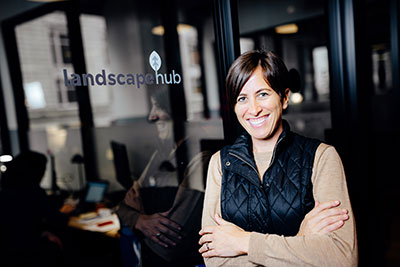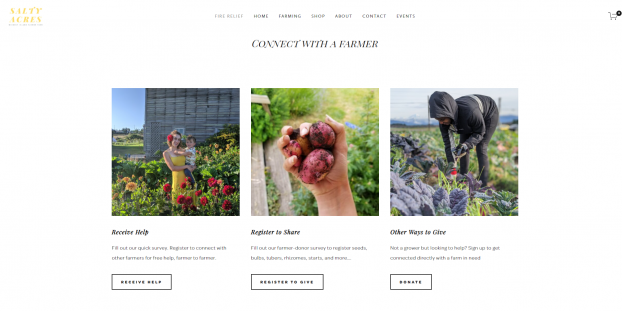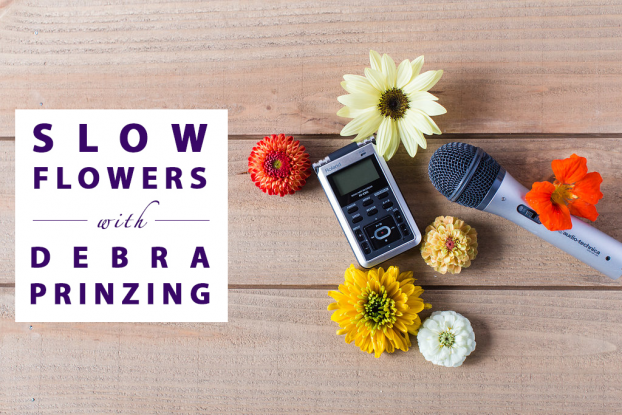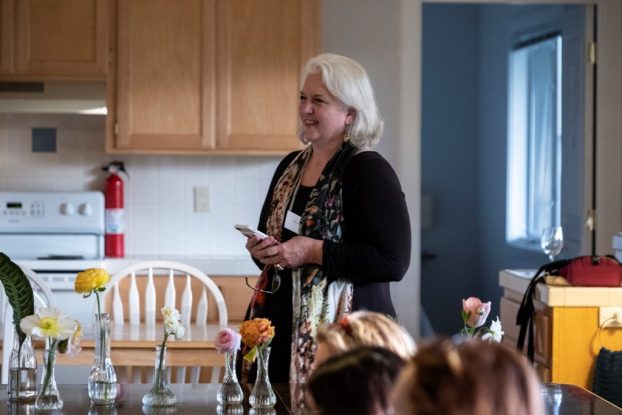Episode 471: Lisa Fiore of Landscape Hub on the digital plant-selling platform that opens new sales channels for Slow Flowers growers
September 16th, 2020
Podcast: Play in new window | Download
Subscribe: Apple Podcasts | Podcast Index | RSS | More

As many of you know, I was very active in horticulture circles as a home, garden and landscaping writer for nearly 20 years, long before I became obsessed with flower farming and floral design. Over the past decade, I have been completely immersed in founding, developing and nurturing the Slow Flowers Movement, which has been the most professionally rewarding experience of my life. And yet, I continue to take side trips back into horticulture. I met today’s guest, Lisa Fiore, CEO of Landscape Hub, on one of those excursions.
We were introduced by a mutual friend, Clint Albin, a nursery industry marketing strategist, who, like me, has an extensive personal network of business contacts who become friends.
Clint attended the 2018 Slow Flowers Summit in Washington, D.C., where he lives, and since then, he has been determined to find a way for us to collaborate as we once did when I was so deeply involved in the horticulture world.
Landscape Hub is proving to be that reason for us to collaborate. Clint introduced me to Lisa Fiore and as I learned what she created with Landscape Hub, I started to understand that there is potential for Slow Flowers members, especially farms and growers, to take advantage of this plant-selling platform.
Here’s the deal: If you are already growing plants for the floral trade, you can potentially use your expertise to also grow plants for the nursery and landscape industry.
We announced a pilot program between Slow Flowers and Landscape Hub and promoted it in our August Slow Flowers newsletter. I’m not sure how many people have even checked out the opportunity that I outlined — to become a grower & wholesale supplier of potted plants through Landscape Hub.

When you listen to my conversation with Lisa, I think it will begin to make sense. Hearing from the person who created a new selling platform for live plants (versus plants cut for the floral trade) may open up your own imagination to a new business channel.
Before we jump into the conversation, here’s a bit more about Lisa Fiore:
Lisa Fiore is Founder & CEO of LandscapeHub, a B2B online marketplace she created and launched in July 2017. A fourth-generation nursery professional, Ms. Fiore realized there was an opportunity to digitize the entire procurement process for the green industry.
Lisa was previously President of Fiore Landscape and Nursery Supply (FLNS), a century-old nursery company. During her sixteen-year tenure, she was responsible for identifying new business opportunities and in leading the company forward during the recession. FNLS significantly grew in revenue and expanded to multiple locations under her leadership.
Lisa holds a Bachelor of Arts degree in English Literature from University of Montana and a Master of Business Administration from Lake Forest Graduate School of Management. She currently serves on the board of directors for the National Association of Landscape Professionals, (NALP); is an advisor to the Women in Landscape Network, (WILN); a member of the Economic Club of Chicago; and a former board director for the Illinois Landscape Contractors Association, (ILCA).
Thanks so much for joining me today for my conversation with Lisa. We know that now, more than ever, our members are seeking new customer channels during the COVID-19 pandemic. I believe that one of those perhaps overlooked or ignored opportunities is to use your farming skills to sell plants (including potted and bare root) into the nursery marketplace, to both trade and retail buyers.
You know how to grow plants – there is no doubt! But have you explored selling plants? I know that some of our members are growing and marketing cutting garden annuals and perennials, vegetable starts, bulb packs and other horticultural products to their customers. Those customers may find you through a grocery store program, farmers’ market, on-farm or pop-up plant sales or through your own retail channel.
As Lisa and I discussed LandscapeHub offers you a potential new channel to sell on this nationwide platform which supplies commercial nurseries and landscapers. LandscapeHub is expanding its online marketplace for the nursery and green industry growers — and you’re invited to participate.
Stay tuned for an upcoming session when I will host Landscape Hub’s team to discuss and demonstrate the platform. I’ll announce a date next week.


Before we wrap up, I want to invite you to join the Fire Relief for Flower Farms effort. During the past 10 days, I’m sure you’ve watched the horrifying images and read devastating reports about wildfires threatening farmland across the West. This is not the first climate crisis to affect the Slow Flowers community in the past few years — season by season, it seems as if every farm is faced with one of them: floods, hailstorms, tornados, hurricanes and wild fires are on the rise seemingly everywhere.
But I can’t help but focus right now on what’s happening in the west — from provinces like British Columbia and Alberta in Canada to states including Washington, Oregon and California in the U.S. It’s so frightening on top of everything else 2020 has thrown our way. Seeing individual Slow Flowers members’ social media posts also makes it highly personal. While it may be weeks or months before the destruction, damage or loss has been calculated, many of you want to help NOW.
Like me, you may be asking: “What Can I Do?”
We are an action-oriented community, right?! Farmers and florists are generous people who readily share their knowledge and resources. So here’s one thing you can do in response to news about the recent wildfire threat to farms in the west. Join Slow Flowers as we support the Fire Relief for Flower Farms effort. This is a farmer-to-farmer show of support created by last week’s podcast guest Tonneli Grutter of Salty Acres Farm.
Now might be the time to assess what you have to share with another farm. Seeds can be collected, tubers, rhizomes and bulbs can be dug and divided, cuttings can be taken. Or, maybe you have an excess inventory of drip irrigation or useful supplies you know another farm might be able to use.
Tonneli has volunteered to collect input from those who wish to receive help, register to donate and show support in other ways. With her big heart, tech talents and savvy marketing skills, Tonneli has created a database for collecting information from those of us who want to share support on an in-kind basis. Just days ago, she texted me with an idea: “is there a way we could make a registry or exchange to donate tubers, bulbs, seeds, etc., in response to farms who may have lost it all?” Tonneli continued: “Flower farmers have already had the toughest year (with) no money left to give, but maybe we can help others rebuild in other ways.”
Thank you to our Sponsors
This podcast is brought to you by Slowflowers.com, the free, nationwide online directory to florists, shops, and studios who design with American-grown flowers and to the farms that grow those blooms. It’s the conscious choice for buying and sending flowers.
And thank you to Florists’ Review magazine. I’m delighted to serve as Contributing Editor for Slow Flowers Journal, found in the pages of Florists’ Review. Read our stories at slowflowersjournal.com.
Association of Specialty Cut Flower Growers. Formed in 1988, ASCFG was created to educate, unite, and support commercial cut flower growers. It mission is to help growers produce high-quality floral material, and to foster and promote the local availability of that product. Learn more at ascfg.org.
Seattle Wholesale Growers Market, a farmer-owned cooperative committed to providing the very best the Pacific Northwest has to offer in cut flowers, foliage and plants. The Growers Market’s mission is to foster a vibrant marketplace that sustains local flower farms and provides top-quality products and service to the local floral industry. Visit them at seattlewholesalegrowersmarket.com.
Longfield Gardens, which provides home gardeners with high quality flower bulbs and perennials. Their online store offers plants for every region and every season, from tulips and daffodils to dahlias, caladiums and amaryllis. Check out the full catalog at Longfield Gardens at longfield-gardens.com.

The Slow Flowers Podcast has been downloaded more than 642,000 times by listeners like you. Thank you for listening, commenting and sharing – it means so much.
As our movement gains more supporters and more passionate participants who believe in the importance of the American cut flower industry, the momentum is contagious. I know you feel it, too. I value your support and invite you to show your thanks and with a donation to support my ongoing advocacy, education and outreach activities. You can find the donate button in the column to the right.

I’m Debra Prinzing, host and producer of the Slow Flowers Podcast. Next week, you’re invited to join me in putting more American grown flowers on the table, one vase at a time. And If you like what you hear, please consider logging onto iTunes and posting a listener review.
The content and opinions expressed here are either mine alone or those of my guests alone, independent of any podcast sponsor or other person, company or organization.
The Slow Flowers Podcast is engineered and edited by Andrew Brenlan. Learn more about his work at soundbodymovement.com.
Music Credits:
Brass Buttons; Fervent; Gaena
by Blue Dot Sessions
http://www.sessions.blue
Lovely by Tryad
http://tryad.bandcamp.com/album/instrumentals
http://creativecommons.org/licenses/by-sa/3.0/
In The Field
audionautix.com








